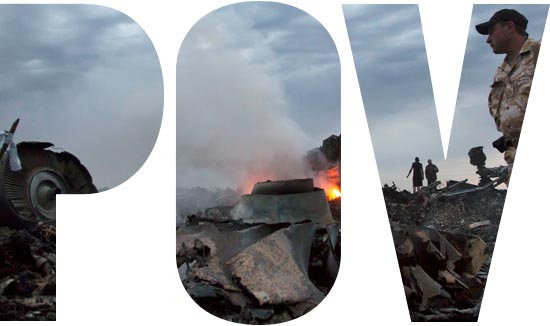POV: Where Is Europe While Ukraine Burns?
After airliner downing, time for our allies to join US sanctions on Russia

Photo by AP Photo/Dmitry Lovetsky
A European Union policy last year is at the root of the Ukrainian conflict that saw last Friday’s horrific downing of a Malaysia Airlines plane (by pro-Russian Ukrainian separatists, according to the United States). The Union offered Ukraine an “association agreement” designed to tighten the political and economic links between the two parties. When the pro-Russian President Viktor Yanukovych was overthrown last February after rejecting the agreement in favor of closer relations with Russia, Russian President Vladimir Putin forcibly annexed the predominantly Russian-speaking Crimean Peninsula. He also provided military and economic assistance to the Russian-speaking population of Eastern Ukraine, whose leaders launched an armed insurrection against the government in Kiev.
In the course of that war of secession in the past several months, one voice has been conspicuously muted amid the global debate about how to resolve this crisis: that of the European Union.
At a dinner party just before the outbreak of violence in Eastern Ukraine, I heard an EU official waxing lyrical about the prospects of bringing the economically depressed, politically unstable, corruption-riddled Ukraine into the EU orbit. He said that would make Ukraine a prosperous, Western-style democracy under the rule of law, the way its neighbor Poland has been. That ambition struck me as an eminently laudable one that had apparently appealed to the Ukrainian people, who had gone to the streets to oust their pro-Russian president. It promised EU financial support to the impoverished people and the virtually bankrupt government in Kiev as well as preferential access to the EU market. It would promote political reforms designed to root out the pervasive corruption and strengthen the shaky democratic institutions in the country. The political provisions of the agreement were signed in March and its economic portion toward the end of last month, even as the violent rebellion against the Kiev government continued to rage with active support from Russia.
The Obama administration has taken a strong stand in opposition to Russia’s support for the secessionist rebellion in Eastern Ukraine. The first round of sanctions included travel bans and asset freezes directed at Russian officials and companies. Last week, a new round targeted Russian financial institutions and blocked US bank loans to the country’s energy and defense businesses.
But the new, unilateral US sanctions are unlikely to have the desired effect on the Russian government unless the European Union joins the campaign. US trade and financial relations with Russia are miniscule; conversely, the European Union imports huge quantities of oil and natural gas from Russia, and Russia depends heavily on these energy exports to pay for a wide variety of essential imports. The European Central Bank is fully capable of providing loans that American banks cannot. To put it bluntly, the EU possesses much more commercial and financial leverage over Russia than the US does. EU trade and financial sanctions, added to those unilaterally imposed by the United States, would send a powerful message to Vladimir Putin.
But from the very beginning of the Ukrainian crisis, Brussels has dragged its feet on following Washington’s lead in imposing economic sanctions, for the very reason that gives the EU its powerful weapon to bring Moscow to heel: trade and finance are a two-way street. The loss of Russian energy imports and Russian bond sales would adversely affect the European economies, just as the loss of the European trade and capital markets would harm the Russian economy.
The day after the downing of the commercial aircraft (most of whose passengers were Dutch), the British and Dutch governments called for a reevaluation of the EU’s relationship with the Russian Federation. If such reconsideration takes place, and if it results in the imposition of tough trade and financial sanctions equivalent to those imposed unilaterally by Washington, then the question, “Where is Europe as Ukraine burns?” will have been answered. But on Tuesday, EU foreign ministers balked at imposing truly tough sanctions on Putin’s regime. Until the Europeans prove willing to endure the economic consequences of sanctions against Russia (while seeking alternative sources of energy to lessen the pain), the Obama administration will be waging a lonely and probably losing campaign to preserve the political independence of a country far from the United States—but right in Europe’s backyard.
William Keylor, a professor of international relations at the Pardee School of Global Studies, can be reached at wrkeylor@bu.edu.
“POV” is an opinion page that provides timely commentaries from students, faculty, and staff on a variety of issues: on-campus, local, state, national, or international. Anyone interested in submitting a piece, which should be about 700 words long, should contact Rich Barlow at barlowr@bu.edu. BU Today reserves the right to reject or edit submissions. The views expressed are solely those of the author and are not intended to represent the views of Boston University.
Comments & Discussion
Boston University moderates comments to facilitate an informed, substantive, civil conversation. Abusive, profane, self-promotional, misleading, incoherent or off-topic comments will be rejected. Moderators are staffed during regular business hours (EST) and can only accept comments written in English. Statistics or facts must include a citation or a link to the citation.